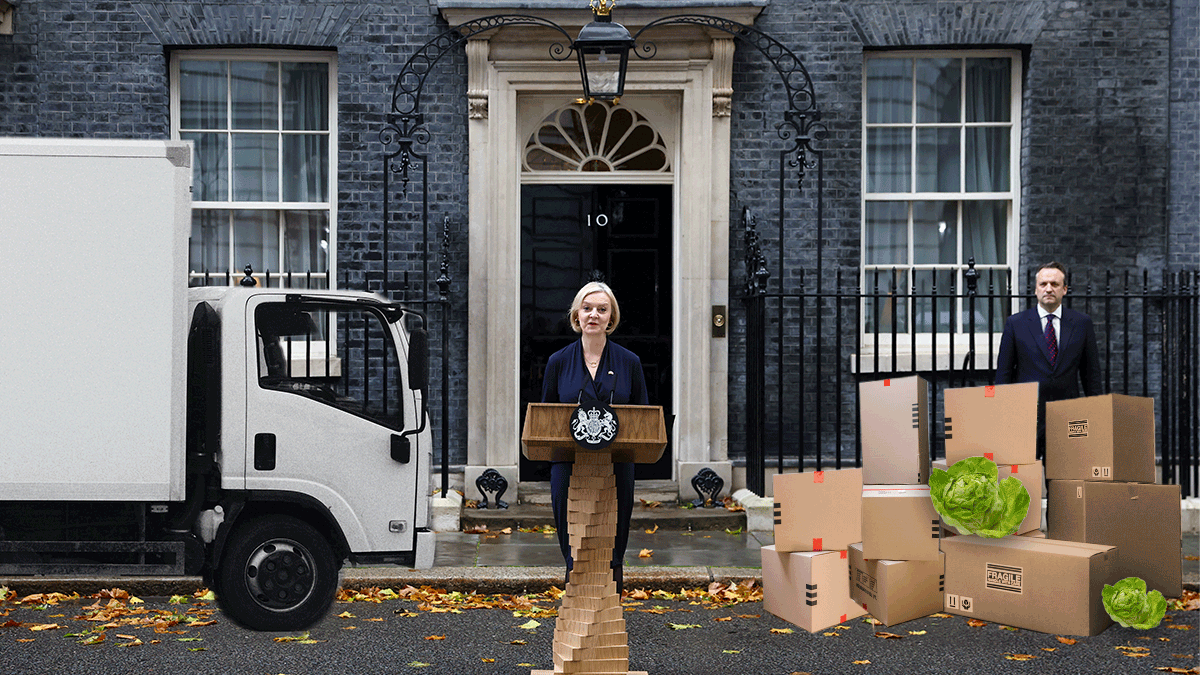October 20, 2022
In the end, poor Liz Truss didn’t even outlast that head of lettuce. At best, she stuck it out for barely four “Scaramuccis.” There are many ways to clock the downfall of the UK prime minister, who resigned on Thursday morning after just 45 days in office, marking the shortest premiership in British history.
Now the UK, which has already had three PMs in as many years, will have had three in less than two months. For a European country that’s not Italy, that’s a lot. And there is no guarantee that things will calm down anytime soon.
“A total and utter shambles, just complete carnage,” is how Mujtaba Rahman, head of Europe research at Eurasia Group, described it mildly.
To refresh: Truss — a Thatcherite chosen by Tory party members to succeed Boris Johnson after his own scandal-driven resignation — got into trouble fast with a major tax cut proposal. It was meant to spur economic growth in an early 1980s kind of way, but fears about its fiscal impact on the UK meant it spooked financial markets in more of a late 2000s kind of way. The pound got crushed so badly that alarm bells rang at the IMF.
Although she shelved the proposal and fired her chancellor for good measure, Truss was unable to stop the bleeding politically, and out came the knives. After the loss of another key official earlier this week, the writing was on the wall — by Thursday morning, Truss simply read it aloud.
Who comes next? Truss pledged that a successor would be in place within seven days. There are thought to be three frontrunners at the moment:
- Rishi Sunak, a centrist technocrat and former chancellor of the exchequer who lost to Truss in the last selection process and openly opposed her tax cut proposals.
- Former Foreign Secretary Penny Mordaunt, the leader of the lower house who finished third behind Truss and Sunak.
- Former Home Secretary Suella Braverman, a fiercely anti-immigrant politician popular among the Tory party’s broader membership.
Current Chancellor Jeremy Hunt has ruled out competing and will stay in his post. He is, after all, due to present a full fiscal plan on Oct. 31. Boris Johnson’s name has also come up — he’s still popular with the party’s base — but Rahman says that while he has some momentum, the former PM may still have too many enemies among party MPs to mount a comeback for now.
Who chooses? The Tories have to work out a succession process that includes party MPs as well as the 170,000 or so party members among the public.
But the politics of those two groups are very different. Conservative Party members nationwide tend to be older, whiter, maler, and much more conservative than the party’s MPs in Parliament.
“If they have a say,” says Rahman, “it moves the center of gravity away from the centrist candidates and much more towards the extremes.” That would hurt Sunak and Mourdant, while opening a path for Braverman.
Tory leaders in parliament have said they will “consult” with Tory party members, but as of this writing, it’s unclear what that means. It could mean agreeing on a list of candidates and presenting it to party members for an online vote. There are also rumors of a “coronation” deal in which the second-place vote-getter among Tory MPs steps aside, all but eliminating the chance for the broader party membership to have a say.
Tory leadership is in a bind: To stabilize the UK’s financial situation, party leaders will want to hand the reins to a safe, centrist pair of hands. But marginalizing party members could provoke a backlash that cripples the Tories and courts further political upheaval.
Buckle up: The next head of lettuce — or 0.7 Scaramuccis if you will — is going to be a wild one in the UK.
For more on this, check out Ian Bremmer’s Quick Take on the “shortest-lived, most shambolic premiership in British history” here.This article comes to you from the Signal newsletter team of GZERO Media. Sign up today.
More For You
- YouTube
In this Quick Take, Ian Bremmer weighs in on the politicization of the Olympics after comments by Team USA freestyle skier Hunter Hess sparked backlash about patriotism and national representation.
Most Popular
Bad Bunny during the Super Bowl LX halftime show press conference at Moscone Center.
Kirby Lee-Imagn Images
100 million: The number of people expected to watch the Super Bowl halftime performance with Bad Bunny, the Puerto Rican superstar and newly minted Album of the Year winner at the Grammys.
Alysa Liu of Team USA during Women Single Skating Short Program team event at the Winter Olympic Games in Milano Cortina, Italy, on February 6, 2026.
Raniero Corbelletti/AFLO
Brazilian skiers, American ICE agents, Israeli bobsledders – this is just a smattering of the fascinating characters that will be present at this year’s Winter Olympics. Yet the focus will be a different country, one that isn’t formally competing: Russia.
What We’re Watching: Big week for elections, US and China make trade deals, Suicide bombing in Pakistan
Feb 06, 2026
Japanese Prime Minister Sanae Takaichi, president of the Liberal Democratic Party (LDP), appeals for a candidate during a street speech of the House of Representatives Election Campaign in Shintomi Town, Miyazaki Prefecture on February 6, 2026. The Lower House election will feature voting and counting on February 8th.
The Yomiuri Shimbun
Japanese voters head to the polls on Sunday in a snap election for the national legislature’s lower house, called just three months into Prime Minister Sanae Takaichi’s tenure.
© 2025 GZERO Media. All Rights Reserved | A Eurasia Group media company.
